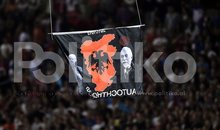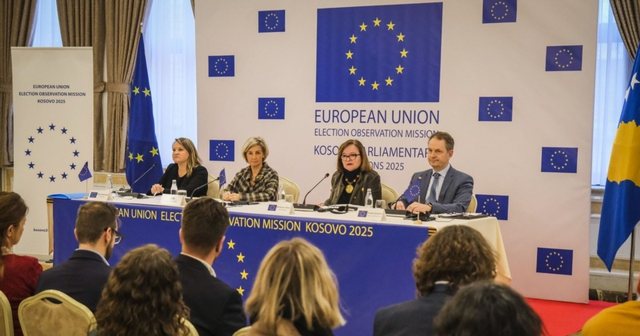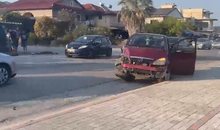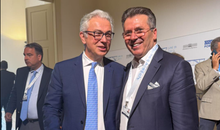
 Flash News
Flash News
EU Mission in Kosovo: We assess the election process positively, but with some shortcomings

The European Union (EU) election observation mission has assessed the February 9 parliamentary elections in Kosovo as positive and peaceful, but with some shortcomings. The ruling party’s negative and inflammatory language towards the media and the judiciary, Serbia’s interference through pressure on Kosovo Serb voters, and a US official’s criticism of Prime Minister Albin Kurti during the campaign were some of the issues raised at a press conference in Pristina on Tuesday.
Nathalie Loiseau, head of the EU observation mission in Kosovo, said that initial findings indicate that election day was calm, voters were able to cast their ballots in good conditions, and the campaign was highly competitive.
"These are signals that the citizens of Kosovo are committed to democracy ," said Loiseau.
About 40.59 percent of the over 1.9 million eligible voters in Kosovo voted on February 9, excluding out-of-state and conditional votes. Prime Minister Albin Kurti's Vetëvendosje Movement won 40.83 percent of the vote, leaving behind the opposition parties, the Democratic Party of Kosovo (22.15%), the Democratic League of Kosovo (17.59%), the Alliance for the Future of Kosovo and Initiative Coalition (7.47%), and the Serbian List (4.43%).
However, Loiseau said the mission observed that the ruling party, the Vetevendosje Movement, used negative language towards the media and the judiciary during the month-long election campaign, from January 11 to February 9.
"This was also reflected on social media. We have noted with concern the negative language from the ruling party against the media and the judiciary. The boycott of specific media outlets and debates has contributed to reducing the opportunity for voters to make better choices," she said.
In early January, international and local non-governmental organizations called on the LVV to abandon its boycott of certain media outlets. The LVV had said that it was not boycotting the media, but was “excluding” three specific channels and that such a decision “would not harm Kosovo’s rich and diverse media landscape.”
She did not name names, but previous reactions from media organizations indicated that some of the country’s major television stations, such as Klan Kosova, TV Dukagjini and T7, were targeted. Loiseau added that polarization and deep divisions were evident in the campaign rhetoric of political parties. The Electoral Complaints and Appeals Panel imposed fines of thousands of euros on various political parties in the country throughout the election campaign for their inflammatory language.
The EU mission head stressed that the number of Serbian political parties participating in the February 9 elections was a positive step, but added that Serbia interfered in the elections by supporting only the Serbian List - the largest Serb party in Kosovo that has usually enjoyed the support of official Belgrade.
"Many interlocutors reported pressure from members of the Serbian List on voters and there was continuous and repeated interference from Serbia ," she said.
A few days before election day, a Serbian candidate for MP told Radio Free Europe that he lost his job after coming out against the Serbian List.
He said that a member of the interim municipal authority in Skenderaj, Nebojsa S. Tomašević, told him on January 27 that he would “make sure that he no longer receives any salary from the Serbian budget, because he is a traitor.”
Marta Temido, head of the delegation of members of the European Parliament, said during the conference on Monday that Serbian authorities intervened by supporting the Serbian List.
"We understand that the Serbian authorities have seriously intervened by supporting one of the six Serbian parties. Our interlocutors have reported that there has been pressure on Serbian voters. The lack of genuine political pluralism in the Serbian community is not healthy," said Temido.
According to preliminary results, the Serbian List has won 9 out of 10 seats reserved for the Serbian minority in the Kosovo Assembly, while Nenad Rašić's Party for Freedom, Justice and Survival has secured the remaining seat. Other political entities from the Serbian community failed to enter the Kosovo Assembly. Loiseau also mentioned in the preliminary report the criticisms that the US envoy for special missions, Richard Grenell, made to Prime Minister Kurti during the election campaign in Kosovo.
"In the campaign, we also witnessed the intervention of the US envoy for special missions, Richard Grenell, on social media, where he criticized Prime Minister Kurti. This can be described as something undiplomatic ," she said.
In an article in X on February 3, Richard Grenell said that the United States needs reliable partners in the Balkans, while Prime Minister Kurti's government, according to him, was not one. Kurti's cabinet did not respond to Radio Free Europe's request regarding these comments, but speaking to a media outlet in Kosovo, Istogu Channel, he reiterated that relations with the US are at their best - to which Grenell reacted again, saying that they have in fact never been at their lowest point.
Loiseau also spoke about several other findings in the preliminary report, such as the difficulties the Central Election Commission faced during the counting of party votes, when its software repeatedly crashed. She said the bloc's mission will publish its final report in about two months, which will include an analysis and recommendations./ REL
Latest news


Not only the body, swimming also helps the brain
2025-07-05 21:02:49
"Be careful with the water", Alimehmeti warns about the health risks of summer
2025-07-05 20:39:10
PSG beats Bayern Munich 2-0, advances to Club World Cup semifinals
2025-07-05 20:19:38

Two vehicles collide on the Elbasan-Peqin axis, drivers injured
2025-07-05 19:26:29

What does Zelenskyy have more than Zegjineja?
2025-07-05 18:45:26

Fiscal peace, but at a cost
2025-07-05 18:00:10
'Bankers' tax evasion, Chinese CEO and former director jailed
2025-07-05 17:39:21
Kyle Walker joins English club on two-year deal
2025-07-05 17:20:24
Two cars collide on the Saranda-Delvina axis, 4 injured
2025-07-05 17:05:29
Touching gesture! Liverpool will pay Jota's family's salary until 2027
2025-07-05 16:45:18
The zodiac signs that cheat most often
2025-07-05 16:25:53

"I asked for the dismissals", Dredha tries to soften Rama's 'blow' in Vlora
2025-07-05 15:48:49
Bomb threat in Parliament, prosecutor: It was a lie
2025-07-05 15:22:28

Bardhi: The recount revealed how greedy Zeqine Balluku is in stealing
2025-07-05 14:44:29
Knife wound on the secondary road Tirana-Durrës, perpetrator sought
2025-07-05 14:37:54
Tears and pain, Diogo Jota is escorted to his final home
2025-07-05 14:21:34
Success starts with yourself! Simple ways to invest in personal development
2025-07-05 13:58:50
Unlicensed firearms found in apartment, 50-year-old arrested in Lushnje
2025-07-05 13:43:11

Tirana Court remands Skerdi Sina to prison
2025-07-05 12:59:34
Cocaine laboratory in Greece, here are the Albanians arrested and wanted
2025-07-05 12:40:16
Directed Justice/Vangjeli: SPAK does not investigate any scandal involving Rama
2025-07-05 12:22:03

Bomb alert, Police remove MPs and media from Kosovo Parliament building
2025-07-05 11:48:16
"The will of the people" and the irony of ordered resignations
2025-07-05 11:32:05
Summer drowning risk: How to enjoy the water without risking your life
2025-07-05 11:20:27
Fire situation in the country, 16 fires reported in 24 hours, 4 still active
2025-07-05 11:07:04
Car hits pedestrian at white lines, injured in serious condition in Vlora
2025-07-05 10:59:58
Mosquito-borne diseases are a growing problem in Europe
2025-07-05 10:44:13



One of Sweden's most dangerous and wanted criminals arrested in Turkey
2025-07-05 09:38:29
Foreign exchange/ How much foreign currencies are bought and sold today
2025-07-05 09:18:38

"Don't be influenced by the opinions of others", today's horoscope
2025-07-05 08:40:50

Morning Post/ In 2 lines: What mattered yesterday in Albania
2025-07-05 08:02:07

Trump says he's ready to raise tariffs to 70% on some countries
2025-07-04 22:35:52
Tre shenjat e zodiakut që do ‘pasurohen’ në Korrik
2025-07-04 22:05:09
Gaza War: Hamas Accepts US Proposal for 60-Day Ceasefire
2025-07-04 21:50:10
Autocracy in Albania, Fuga: Governance has gotten out of control
2025-07-04 21:40:51
Meta: Agriculture on credit, the new fraud!
2025-07-04 21:26:39




Vote recount in Durrës ends without changes
2025-07-04 20:12:54
Gas station explodes in Rome, 25 injured (VIDEO)
2025-07-04 20:00:20

These afternoon habits often sabotage weight loss
2025-07-04 19:39:28
Former Arsenal player Thomas Partey accused of rape
2025-07-04 19:24:21
Shepherd disappears without a trace in Delvina
2025-07-04 19:14:31

Bardho gave Zegjine's mandate/Braho: Unfair! It violates the electoral system
2025-07-04 19:01:08


Rapid developments in the Sultanates!
2025-07-04 18:00:06



Italy tightens rules for skateboard traffic
2025-07-04 17:20:18

Unusual for the time, dense fog covers the coast of Vlora
2025-07-04 16:48:01


Accident on the Shkodra-Lezhë axis, one dead and 3 injured
2025-07-04 16:14:19
Albania with fewer requests for asylum and Albanian citizenship in 2024
2025-07-04 16:06:57

Albania last for quality of life, DP: Technical government is the solution!
2025-07-04 15:42:30
Nico Williams says "No" to Barcelona, signs with Athletic Club until 2035
2025-07-04 15:33:35
Fires in the country, four fires are still active, what is the situation?
2025-07-04 15:24:20

Summer brings big changes for these 4 zodiac signs
2025-07-04 15:00:04
Osmani: MPs need to agree to a secret ballot for the Speaker of Parliament
2025-07-04 14:51:09
Serious accident on the Peqin-Elbasan axis, two injured
2025-07-04 14:37:56

GJKKO leaves in force the security measure for the head of the KPP
2025-07-04 13:58:17
Who will replace Ilir Meta and take over the leadership of the PL?
2025-07-04 13:50:36
Berisha: Dismissal of directors in Vlora, another act of 'scapegoats'
2025-07-04 13:41:46




Librazhd/ In a serious psychological state, the young man consumes pesticides
2025-07-04 13:05:07


Weapons trafficked from Kosovo to Albania, two arrested, 8 pistols seized
2025-07-04 12:33:28
Konsumimi i tepërt i çokollatës, ja cilat janë dëmet që shkakton në organizëm
2025-07-04 12:23:35

Fires in the country, 21 fires in the last 24 hours, 4 still active
2025-07-04 12:00:19
WB calls for debt transparency: Albania to publish details of every loan
2025-07-04 11:50:05
